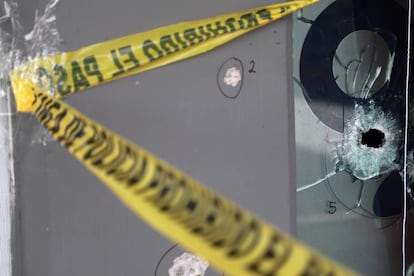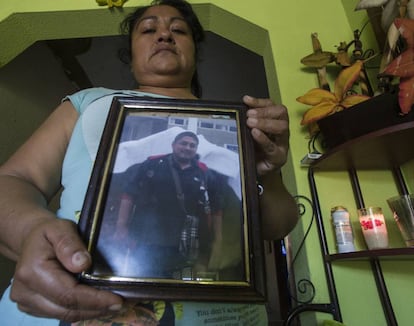With ‘El Chapo’ Guzmán gone, war erupts in Mexican state of Sinaloa
Extradition to US of drug lord sparks power struggle that has left 235 people dead in two months
On the afternoon of February 7, Zenén Santiago Ojeda was in the wrong place at the wrong time. On his way with a friend to an automotive spare parts shop, the 41-year-old agricultural laborer found himself in the middle of a gunfight between rival gangs of drug traffickers in the small town of Villa Juárez, in the western state of Sinaloa. As he took shelter in a gas station, along with his friend and another passerby, he was felled by stray bullets.

“He had just finished his primary school diploma so that he could help our child with his studies,” says his heavily pregnant wife Eva.
Villa Juárez, an agricultural community that lies a few kilometers outside the state capital of Culiacán and the Pacific Ocean, has seen a sharp rise in crime since the beginning of the year. Homicides in the home town of the Sinaloa cartel have risen 30% on the same period in 2016. Between January and February of this year there have been 235 murders, according to official figures. The reason is the extradition of Joaquín El Chapo Guzmán, which has sparked a power struggle in the cartel he founded.
Since January 21, two police officers have been killed and three are missing in Culiacán
State governor Quirino Ordaz Coppel, who took office in January, has so far proved unable to contain the violence. Local police have failed to impose order, and the army and navy have been brought in, so far with little impact, says security specialist Alejandro Sicairos.
Culiacán is suffering from an outbreak of violence that shows no signs of stopping, with some 15 people losing their lives, among them children, in the first five days of this month.
On February 24, a man opened fire with an AK-47 in a crowed bar: three people were killed and five wounded.
“In Culiacán and the agricultural areas, people are very frightened, they don’t send their children to school or don’t work because there is an internal war going on and we don’t know when it will end,” says Sicairos.
In one incident, a man opened fire in a crowded bar with an AK-47
Nearby Navolato has also been hit by the fight to control the Sinaloa cartel between Dámaso López, a former colleague of Joaquín Guzmán, and a group led by one of his brothers, Aureliano Guzmán, who have been dubbed Los Chapitos. On February 21, an armed group took over a bus carrying agricultural laborers to work: after forcing everybody off, they set fire to the vehicle and fled.
In a recent gunfight between rival factions in Villa Juárez, day laborer Norberto Salazar was killed. The local authorities told his family he was a gang member, but they say he worked in the fields and that they have testimony from witnesses he was shot by police as he fled in his car from a shootout.
“His father was shown a photograph of his body with a gun, but that’s a lie, that pistol was put there by the police,” says his mother, Blandina Ponce, adding: “I don’t know why they stained his memory like that, if everybody knows that he worked honorably.”

Local police officers have also been targeted. Reyes Yosimar García, aged 28, was due to marry in May and leave the force after five years’ service. On January 26, armed men went to his house and took him away at gunpoint.
He has not been seen since. “We have talked with the state attorney, but so far, nothing. They say he is dead, but we want them to find him alive and bring him home,” says his mother.
Since January 21, two officers have been killed and three are missing, among them Reyes Yosimar García.
The Sinaloa cartel is believed to have attacked a military convoy in October, during which it took police officers prisoner. The authorities believe they are being held hostage.
Alejandro Sicairos says the Sinaloa cartel is sending a message to the state governor to allow it to continue running the local police force, as was the case under his predecessor. Ordaz Coppel has placed members of the armed forces at the head of police units. “They are trying to regain control of the police and are saying to the government that if it doesn’t give in, they will continue attacking officers,” explains Sicairos.
English version by Nick Lyne.
Tu suscripción se está usando en otro dispositivo
¿Quieres añadir otro usuario a tu suscripción?
Si continúas leyendo en este dispositivo, no se podrá leer en el otro.
FlechaTu suscripción se está usando en otro dispositivo y solo puedes acceder a EL PAÍS desde un dispositivo a la vez.
Si quieres compartir tu cuenta, cambia tu suscripción a la modalidad Premium, así podrás añadir otro usuario. Cada uno accederá con su propia cuenta de email, lo que os permitirá personalizar vuestra experiencia en EL PAÍS.
¿Tienes una suscripción de empresa? Accede aquí para contratar más cuentas.
En el caso de no saber quién está usando tu cuenta, te recomendamos cambiar tu contraseña aquí.
Si decides continuar compartiendo tu cuenta, este mensaje se mostrará en tu dispositivo y en el de la otra persona que está usando tu cuenta de forma indefinida, afectando a tu experiencia de lectura. Puedes consultar aquí los términos y condiciones de la suscripción digital.








































